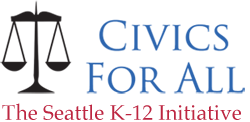2. Curricular Frameworks
“Curricular Frameworks”: Common Curricular Frameworks, Structures and Traditions in the K-12 Proposal:
- Annual MockElections each November, K-12
- One New K-12 Civics/Electionsunit in each year’s social studies classes; depending on teacher preference and student interest, units would be 3 – 10 class periods each autumn
- Two K-12Civics Frameworks Banners:
- Essential Civics for All Questions– posted in every K-12 classroom
- Political Spectrum– posted in all gr: 6-12 social studies classrooms
- K-12 Media Literacy– especially related to electoral politics and current events
- Civics Website– updated reg. with shared curriculum, elections lesson plan ideas, current events lessons, links, etc.
- Community Engagement:
- Voter Registration/Participation Drives– K-12 students, classes, and schools can compete to see who can register the most new voters in their communities and/or get already registered voters (including parents) to actually vote.
- Parent/Guardian Engagement – students are given homework assignments to discuss the mock elections issues and races with their parents/guardians.
Civics for Allis “Civics in the Core”because civics studies align so smoothly with the comingCommon Core State Standards‘ emphasis on distilling argumentative claims from non-fiction texts.
Civics for Allaligns directly with and will facilitate studentsuccess on the “New SAT,” which is slowly aligning with the Core and will emphasize America’s founding documents and current events analysis for the first time in the history of the test.
Civics for All cultivates “21stCentury Skills,”Including:Creative and Critical Thinking,Communication Skills,Collaboration skills,Growth Mindset and Perseverance
« 1. Pedagogical / Philosophical Underpinnings3. Civic Literacy »





